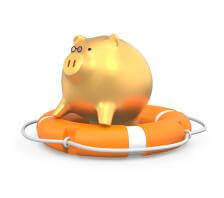How Much Emergency Fund Do You Need?
So how much of an emergency fund does a person need and should you save up an emergency fund before paying off debt?

I’ve often heard that, as a rule of thumb, you should have enough money in savings to live for three months. I don’t have this now. Does it make sense for me to spend a few months building up my savings account while making minimum payments on debt, so that I have some reserves?
Thanks for the question, Nick.
So how much of an emergency fund does a person need and should you save up an emergency fund before paying off debt?
Everyone Needs an Emergency Fund
Everyone needs an emergency fund. If you don’t already have one, start saving for one today (episode 123 has some great tips on how to cut back on spending to generate extra money). Not tomorrow. Today. Unexpected things can happen that may mean having to go without your income for awhile. You’ll have peace of mind if you’re prepared to weather a period without your usual income.
Financial planners typically recommend creating an emergency fund equal to three to six months of living expenses. How much of an emergency fund you need depends on your specific situation. If you work in a thriving field where jobs are plentiful and easy to come by, you may feel comfortable with just three months of living expenses as your emergency fund. But if jobs in your field are few and far between, you might want a bigger emergency fund that you could tap into for, say, a year, if you were ever to find yourself out of a job.
To figure out your emergency fund amount, add up your living expenses for a typical month. Then multiply that number by the number of months worth of emergency fund you’d like to have. That’s the amount you’ll want to save up.
Should You Pay off Debt First?
And if you have debt, should you pay it off before you save up your emergency fund?
It’s safest to create an emergency fund even if you’re carrying some debt. Creating even a small emergency fund will make you better able to weather life’s storms.
How you decide to balance paying off debt with creating your emergency fund depends on the interest rate on the debt and whether you want to pay the debt off as quickly or as slowly as possible. If it’s a really low interest student loan, for example, you might decide that paying it off as slowly as possible makes sense for you. In this case, you’d want to save up your emergency fund while continuing to make minimum payments on your student loan.
If, on the other hand, you have high interest credit card debt, you’ll want to pay it off as quickly as possible. In this case, if your ultimate emergency fund goal were, say, six months of living expenses, you might want to first save up three months’ worth, then pay off your high interest credit card debt, and then continue to build your emergency fund up to your desired six months’ worth of living expenses.
It’s important to keep your emergency fund in a separate account that will preserve it and make it readily accessible if you should ever need it. A savings account or a money market account are both good places to keep your emergency fund. You can search to see which savings and money market accounts are paying the highest interest rates at
Use It for Real Emergencies Only
And here’s one last tip: Always resist the temptation to dip into your emergency fund for things that aren’t true emergencies. Holiday shopping, putting money into the hot stock your uncle just told you about, and getting a new mountain bike are not emergencies. Your emergency fund is there to protect you in the event that you lose your job, are unable to work, or go through some other type of major life upheaval. Hopefully, you won’t ever need to use your emergency fund, but if you do, you want it to be there for you. So resist the temptation to put your hand in the cookie jar! [[AdMiddle]
After you’ve saved up your emergency fund, you’ll be ready to put the money you save beyond that point to work for you by starting to build your investments.
Today, I have two copies of Ric Edelman’s new book The Lies About Money to give away. And the winners are Milena in Lake Worth, Florida and Carina. Congratulations and be sure to check your e-mail for instructions.
If you have a question or comment, e-mail it to money@quickanddirtytips.comcreate new email. Also, I’d really appreciate it if you took a moment to post a review at iTunes. Money Girl is part of the Quick and Dirty Tips network. Be sure to check out the other great shows like Grammar Girl and Modern Manners Guy.
Thanks for listening!
Emergency Piggy Bank image courtesy of Shutterstock

